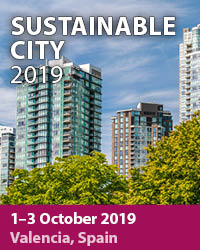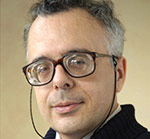Sustainable City 2019
13th International Conference on Urban Regeneration and Sustainability
![]()
1–3 October 2019
Valencia, Spain
Overview

The 13th International Conference on Urban Regeneration and Sustainability took place in Valencia, Spain, from 1st to 3rd October 2019. The Conference was organised by the Wessex Institute, UK, represented by Professor Stefano Mambretti, and the Polytechnic University of Valencia, represented by Professor Jose Luis Miralles i Garcia.
The conference, which started in Rio, Brazil (2010), is well-established and always attracts a substantial number of contributions from different backgrounds and countries. The variety of topics and experiences is one of the main reasons behind the success of the series.
Conference Publication
Accepted papers presented at this conference will appear in Vol. 238 of the WIT Transactions on Ecology and the Environment (ISSN: 1743-3541). Papers included in this volume will be available Open Access in the eLibrary of the Wessex Institute (https://www.witpress.com/elibrary) from where they can be freely downloaded by any interested parties.
Opening of the Conference
The conference was opened by Professor Mambretti and Jose Luis Miralles who welcomed the delegates to the conference, before paying tribute to the founder of the Wessex Institute, the late Prof Carlos A Brebbia.
Professor Mambretti then mentioned that the main objective of WIT is the dissemination of knowledge, with particular emphasis on science and engineering. Another way in which this is achieved is by the publication of papers from conferences and Journals, through its publishing arm, WIT Press.
Professor Miralles i Garcia of the Polytechnic University of Valencia, gave a presentation welcoming the delegates to the city of Valencia.
Invited Presentations
There were a series of invited lectures on advanced topics of research and applications, as follows:
- “Energy rehabilitation of buildings through phase change materials and ceramic ventilated facades”, by Victor Echarri, University of Alicante, Spain
- “The effective and emotional dimension of built space - assessment to risk reduction process. Heritage as stability benchmark in sustainable city”, by Cristina Gociman, University of Architecture and Urban Planning, Romania
- “Personal travel planning - a review of soft transport measure criteria and effects”, by Daniela Muller-Eie, University of Stavanger, Norway
- “Mapping land-changes using GIS to identify the potential supply of regulating services in a mountain ecosystem: the high-Andean Puna”, by Jose Luis Miralles i Garcia, Polytechnic University of Valencia, Spain
- “Planning long-term management for historic cities. The rock integrated and sustainable management plan”, by Danila Longo, University of Bologna, Spain
- “The future of dwelling: Density”, by Camilo Cerro, American University of Sharjah, United Arab Emirates
- “Architectural programming for balanced local urban centre”, by Robert Barelkowski, West-Pomeranian University, Poland
- “Sustainability of historical and artistic heritage buildings”, by Alejandro Acosta Collazo, Autonomous University of Aguascalientes, Mexico
Conference Sessions
The papers presented during the conference were classified under the following headings:
- Urban strategies
- Planning, development and management
- Quality of life
- The community and the city
- Architectural issues
- Urban conservation and regeneration
- Planning for risk and natural hazards
- The community and the city
- Cultural heritage sites
- Urban transportation and planning
- Environmental monitoring, assessment and management
There were numerous occasions for holding informal discussions during the coffee breaks and the complimentary lunches provided.
Organ Concert
On the first evening of the conference, delegates were invited to attend an organ concert by Arturo Barba at the Sagrado Corazon de Jesus Church. Arturo is an internationally recognised organist born in Valencia. The concert was organised in celebration of the Prigogine Medal Ceremony which took place the following day.
Prigogine Award Ceremony
The Prigogine Medal was established in 2004 by the University of Siena and the Wessex Institute to honour the memory of Professor Ilya Prigogine, Nobel Prize Winner for Chemistry. Prigogine’s ideas established the basis of ecological systems research. The Prigogine medal to honour his memory is awarded annually to a leading scientist in the field of ecological systems. All recipients have been deeply influenced by Prigogine’s work.
The 2019 Prigogine Award Ceremony took place on Wednesday, 2nd October at the Polytechnic University of Valencia and was awarded to Professor Luc Montagnier.
The ceremony was opened by the Rector of the University, Dr Francisco J Mora Mas, who welcomed the delegates to his university and presented Prof Montagnier with his medal.
Professor Luc Montagnier graduated in Medicine as well as in Biological Sciences at the University of Paris. At the age of 23, he became an Assistant to a Professor there.
After a fruitful post-doctoral stay at two British laboratories, he spent most of his career at two renowned French institutions, namely the Institut Curie and the Institut Pasteur in Paris. At the Institut Pasteur, where he spent almost 30 years, he founded the Viral Oncology Research Unit within the Department of Virology. His focus was cancer viruses, mainly the oncogenic retroviruses, and the biochemical aspects of interferon and malignant transformation, including membrane changes in relation to the growth in soft agar, for which he contributed to the revelation of a new property of cultured malignant cells.
In 1983, Montagnier led the team which first isolated the Human Immunodeficiency Virus (HIV1) and brought the first evidence that this virus was the causative agent of AIDS. In 1985 he isolated the second AIDS virus (HIV2) from West African patients.
Montagnier’s Laboratory was also the first to show that a large percentage of the white blood cells in HIV infected patients were prone to dying by apoptosis, a process of programmed cell death and to attribute its origin to the oxidative stress occurring in the patients, possibly associated with co-infections.
His current work is in the diagnosis and treatment of microbial and viral factors associated with cancers, neurodegenerative and articular diseases, using innovative technologies. As a strong advocate of preventive medicine, he is especially concerned with prolonging the active life of ageing people.
Beyond Montagnier’s scientific interest is his deep involvement in helping developing countries to acquire knowledge of and access to modern and preventive medicine. As President of the World Foundation for Aids Research and Prevention, he has co-founded two Centres for the prevention, treatment, research and diagnosis of AIDS patients in Ivory Coast and Cameroon.
Ten years ago, Professor Montagnier co-founded CHRONIMED, an international group of physicians treating chronic diseases including, but not limited to, Autism spectrum diseases, Alzheimers, Lyme, Multiple Scleroses and Cancer.
Various treatment modalities are used for these multi-factorial conditions. Most of these treatments were developed upon the research of Montagnier and his Chronimed associates.
At its premises in Geneva, Switzerland, Fondation Luc Montagnier, together with its associated Chronimed clinicians, carries out cutting edge research and treatments, bringing in international investigators in various fields.
Luc Montagnier has been awarded many Prizes, including Prizes Rosen (1971), Gallien (1985), Korber (1986), Jeantet (1986), the Lasker Prize in Medicine (1986), the Gairdner Prize (1987), Santé Prize (1987), Japan Prize (1988), King Faisal Prize (1993), Amsterdam Foundation Prize (1994), Warren Alpert Prize (1998), Prince of Asturias Award (2000) the induction to the National Invention Hall of Fame (2004). He is Commandeur de l'Ordre National du Mérite (1986) and Grand Officier of the Legion of Honour (2009)
In 2008, he was awarded the Nobel Prize for Physiology and Medicine, for his discovery of HIV, together with Françoise Barre-Sinoussi.
He is the author or co-author of 350 scientific publications and of more than 150 patents.
Professor Montagnier presented a special Prigogine lecture "New Paradigm in Biology".
Following this, the university offered a cocktail reception.
Conference Dinner
The conference banquet took place in the unusual setting of the restaurant located under the city Aquarium, and surrounded by a 360 degrees water tank. The excellent dinner, consisting of different courses with good local wines, helped to create a convivial atmosphere for the participants. The short walk from the conference location to the restaurant allowed them to appreciate some of the works of Santiago Calatrava, including his Palace of Arts, the Museum of Sciences and the Agora, as seen from the bridge built by Calatrava over the old bed of the Turia River. The Aquarium building in the Oceanographic Centre, as well as its companion structure where the restaurant was located, is the work of the renowned Mexican engineer, Felix Candela, and consists of two very attractive hyperbolic paraboloids. The banquet was most successful.
Closing of the Conference
The conference was closed by Professor Mambretti who thanked the delegates for attending and hoped that they would consider attending the next conference in the series which is due to be reconvened in 2020 in Rome.
Related Conferences
Eco-Architecture 2020, 5–7 May 2020
SDP 2020, 6–8 May 2020
Urban Agriculture 2020, 12–14 May 2020
Water Pollution 2020, 13–15 May 2020
Air Pollution 2020, 8–10 Jun 2020
Environmental Impact 2020, 10–12 Jun 2020
Waste Management 2020, 7–9 Jul 2020
Sustainable Tourism 2020, 8–10 Jul 2020
Sustainable City 2020, 22–24 Sep 2020


 Wessex Institute
Wessex Institute